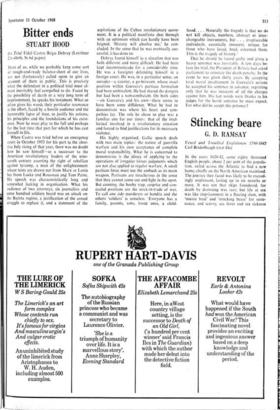Bitter ends
STUART HOOD °
On Trial Fidel Castro/Rgis Debray (Lorrimer 21s cloth, 9s 6d paper) Most of us, while we probably keep some sort of rough-and-ready balance-sheet of our lives, are not (fortunately) called upon to give an account of them in public. This is precisely what the defendant in a political trial must al- most inevitably feel compelled to do. Faced by the possibility of death or a very long term of imprisonment, he speaks his testament. What so often gives his words their particular resonance is the effort, faced by a hostile audience and the inexorable lapse of time, to justify his actions, his principles and the foundations of his exist- ence. Now he must play to the full and perhaps for the last time that part for which he has cast himself in life.
When Castro was tried before an emergency court in October 1953 for his part in the abor- tive July rising of that year, there was no doubt how he saw himself—as a successor to the American revolutionary leaders of the nine- teenth century asserting the right of rebellion against tyranny, a man of the enlightenment whose texts are drawn not from Marx or Lenin but from Locke and Rousseau and Tom Paine. His speech was characteristically long and somewhat lacking in organisation. What his audience of two attorneys, six journalists and some hundred soldiers heard was an attack on the Batista regime, a justification of the armed struggle to replace it, and a statement of the aspirations of the Cuban revolutionary move- ment. It is a political manifesto shot through with an optimism which can hardly have been feigned. 'History will absolve me,' he con- cluded. In the sense that he was eventually suc- cessful, it has done so.
Debray found himself in a situation that was both different and more difficult. He had been kept incommunicado for a considerable time. He was a foreigner defending himself in a foreign court. He was, in a particular sense, an outsider—a courier, a go-between, whose exact position within Guevara's partisan formation had been ambivalent. He had shared the dangers but had been a non-combatant. On both sides —on Guevara's and his own—there seems to have been some diffidence. What he had to demonstrate was where his heart and sym- pathies lay. The role he chose to play was a familiar one for our times: that of the intel- lectual involved in a revolutionary situation and forced to find justifications for its necessary violence.
His highly organised, Gallic speech deals with two main topics: the nature of guerrilla warfare and his own acceptance of complete moral responsibility. What he is concerned to demonstrate is the idiocy of applying to the operations of irregular forces judgments which are not also applied to regular warfare. A small partisan force must use the ambush as its main weapon. Partisans are treacherous in the sense that they cannot come out and fight in the open. But cunning, the booby trap, surprise and con- cealed positions are the stock-in-trade of war. To call one side murderers or bandits and the others 'soldiers' is senseless. 'Everyone has a family, parents, sons, loved ones, a child-
hood. . . . Naturally the tragedy is that we do not kill objects, numbers, abstract or inter- changeable instruments, but . . . irreplaceable individuals, essentially innocent, unique for those who have loved, bred, esteemed them. This is the tragedy of history.'
That he should be found guilty and given a heavy sentence was inevitable. A tew days be- fore the trial, the President of Bolivia had asked parliament to reinstate the death penalty. In the event he was given thirty years. By accepting total moral involvement in Guevara's actions he accepted his sentence in advance, regretting only that he was innocent of all the charges against him. His last words were thanks to his judges for the harsh sentence he must expect. For what did he accept this penance?






































 Previous page
Previous page